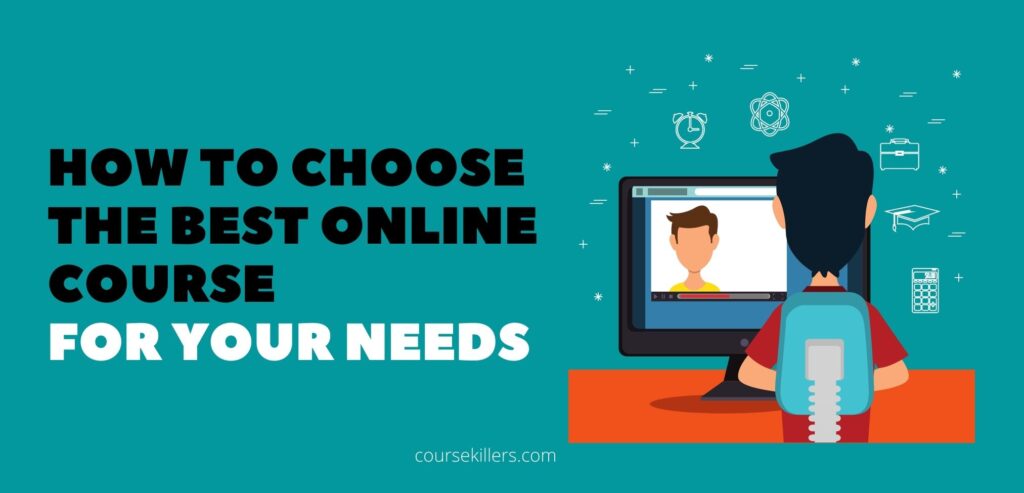
Whether you’re looking to take a course in digital marketing, plc programming, or stock trading, there’s a huge challenge you’ll face. There are hundreds of online education platforms, coaches, online courses. How do you make a choice? How do you ensure that you don’t waste your money on something you don’t like, understand or need?
CourseKillers team has passed dozens of online courses, training and certifications. Before writing this article, we gathered 23 online course experts in the room and asked them to share how they choose the right online course whenever they want to upgrade their knowledge.
It turns out, they are asking some particular questions and follow pretty much the same procedure. In this post get some tips and tricks for choosing the right online course for you.
1. Setting a Goal

Whatever domain you choose, there are thousands of courses and instructors. Let’s see how to choose the best online course for your needs.
The first step is deciding what you want from a course and why you need it. Do you want a course to improve your skills for work and you want to develop a specific skill? Or a course that is endorsed/recorded by a celebrity? Or maybe a course just to kill some time? Maybe you know which topic you want to study, or maybe you don’t.
It’s time to be honest with yourself. Why do you want to take a course? What are you expecting in terms of knowledge and result? Before you start looking for a course, try to establish exactly what you want or need from it. Try answering these questions:
- Do you expect career growth and salary increase or do you want to learn something because it’s fun and interesting?
- In which way your life will be different after the course?
- Are you willing to take a shorter online course (several hours) or an in-depth course (several months)?
- Do you want to learn from someone in particular or do you want to learn the domain in general?
- How much are you willing to spend on an online course?
A special question to ask is whether whatever you want to learn is a hard skill or a soft skill. Do you want to learn how to launch a campaign on Instagram (hard skill) or do you want to become an excellent negotiator?
Is Online Course An Option?
Once the COVID19 pandemic hit the world, everything moved towards online. You can learn anything online. Most probably, if you want to learn something, you’ll be mostly exploring online education.
Some people claim online courses are effective for anything. We at Course Killers after completing over 50 courses both online and offline believe that for most skills online education is a great idea. Here’s why.
Whether it’s building your home, investing in the stock market, master affiliate marketing or learn PLC programming, taking an online course will improve your understanding of the topic and will create a solid foundation for researching the topic even more.
However, there are still some occasions when an online course might not be a good fit. This holds true if you need to develop a certain social skill for working with people such as public speaking, negotiations or teamwork. If this skill is associated with communication, you’ll probably have a hard time master it alone even if there are course instructors to check your hometask.
We believe that the first question that might help is asking yourself: is an online course an option? Will I master the skill I need using all the online materials and techniques?
If the answer is yes, let’s explore the next step.
2. Price: How Much Are You Willing to Pay?
Apparently, the price of one of the most important decision-making factors. In any domain, you can find options pretty much from $10 to $1,000. The question is: what’s the difference and will a $1,000 course make you a better professional than a $10 course?
Paid Courses: How Much Does It Take To Master a Skill?
Normally, a course under $50 is an on-demand video course that’ll give you some basic understanding of the topic. It doesn’t include any content-related support, moderators or home tasks. There are a lot of such courses on Coursera, Udemy, SkillShare and many other online education platforms.
If the price is over $100, there’s normally support or at least a commitment to reply to all questions.
If the course is several hundred dollars, then it most often suggests there’s a whole team to support you and the instructor is ready to reply to all your questions.
Free: Are Free Online Courses Worth It?
In every domain there are free courses. Is it worth to spend money on a course when you can find a free training?
No one wants to work for free. Generally, if a product is free, then it’s probably promoting another product, which is a paid one. Let me put this more clearly. The thing is if you give out all the information in the free course, you won’t be buying a paid one. That’s why most free courses contain only basic information.
Thus, if your goal is to get a basic understanding of the topic, then you might want to start with a free course but be ready that a tutor will be upgrading you to a paid product throughout the course.
3. Create a list of courses and make the comparison
Depending on what you want to learn, there are several resources you might check. We recommend checking Udemy, Coursera, Masterclass and Skillshare as these are the largest platforms that definitely have something to offer.
At Course Killers, we often create a list of all the courses on the subject that seem to be of interest. After that, we create a criteria for exclusion. Your criteria can be
- experience level (beginner/advanced)
- price (low-high)
- feedback (only the courses with rating over 4.5)
After you have an extended list of education options, narrow down your choices using your criteria. After you’re familiar with what the courses cover and who they’re for, you need to check them against the criteria you set out in step one. Which course best meets your needs?
If you find several courses that meet your criteria, don’t worry. Open up each course page, read the course description(s) thoroughly. Though this step seems to be evident, it’s actually one of the most important steps that is often skipped. Take some time to read all course descriptions thoroughly, making sure you know exactly what to expect. As you’ve done some courses in the past, make sure you know how this course is different from what you already know, what kind of support is there, what you will learn.
Should You Trust Feedback?
It’s hard to be objective when it comes to online courses because our criteria set is very different. As we review a lot of online courses and read course feedback thoroughly, we can guarantee there’s no popular course that doesn’t have at least one 1-star review.
‘The instructor speaks too slow’, ‘I can’t understand what he was saying cause it was too fast’. These are reviews from the same course on Udemy. It’s impossible to be great for everyone.
It’s worth checking reviews just to see if there’s something important from your criteria was mentioned. Overall, we’d recommends to go with your gut and not the reviews, especially if there are less than 1,000 reviews left for the course you’re interested in.
4. Choose Your Instructor

It’s very hard to pick up an online course based on the course instructor’s regalia. It turns out even the brightest mind can be a dull fish when it comes to an online course.
So what do you do? A course typically has a preview. Watch all previews to define if you like the instructor’s tone. Check out his/her YouTube, see if he/she’s the person you trust has all it takes to lead you to your goal. Most often, if you trust the person and his/her expertise, that’s enough to enroll in the course.
5. Make your choice and start learning
You’ve browsed, you’ve read the small print, you’ve checked the criteria and, if it’s all gone to plan, you should have a course lined up. The only thing left to do is get started!
If the course doesn’t start for a little while, add a reminder to your calendar or make a note in your diary, so you’re ready when it does start.
Conclusion
In this article we’ve looked at some ways on how to choose the best online course for your needs. Remember that even if the course is online, 80% of the result you get depends on the amount of work you’ve done and questions you’ve asked so be prepared to invest your energy and time and you’ll do great.
Don’t forget to subscribe to Course Killers updates. We review courses from different domains to help you pick the best options for your needs.



